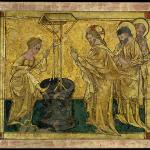From the Washington Post:
Five key Catholic bishops are opposing the newly authorized Violence Against Women Act for fear it will subvert traditional views of marriage and gender, and compromise the religious freedom of groups that aid victims of human trafficking.
The act…signed into law by President Obama on Thursday (March 7), is intended to protect women from domestic violence, sexual assault and human trafficking, and allows the federal government to spend money to treat victims and prosecute offenders.
But for the first time since the original act became law in 1994, it spells out that no person may be excluded from the law’s protections because of “sexual orientation” or “gender identity” — specifically covering lesbian, transgender and bisexual women.
That language disturbs several bishops who head key committees within the U.S. Conference of Catholic Bishops that deal with, among other issues, marriage, the laity, youth and religious liberty.
“These two classifications are unnecessary to establish the just protections due to all persons. They undermine the meaning and importance of sexual difference,” the bishops said in a statement released by the USCCB on Wednesday.
“They are unjustly exploited for purposes of marriage redefinition, and marriage is the only institution that unites a man and a woman with each other and with any children born from their union,” the statement continued.
Bishop Stephen E. Blaire of Stockton, Archbishop Salvatore J. Cordileone of San Francisco, Bishop Kevin C. Rhoades of Fort Wayne-South Bend, Archbishop William E. Lori of Baltimore and Archbishop José H. Gomez of Los Angeles.March 6, 2013The United States Conference of Catholic Bishops (USCCB) has a history of supporting the Violence Against Women Act (VAWA), and of providing ongoing support to victims of domestic violence through our social service programs. This support is consistent with Catholic social teaching that reveres the inherent and inviolable dignity of all human persons. In our pastoral statement When I Call for Help, the bishops wrote: “As pastors of the Catholic Church in the United States, we state as clearly and strongly as we can that violence against women, inside or outside the home, is never justified. Violence in any form — ‘physical, sexual, psychological, or verbal’—is sinful.”
Unfortunately, we cannot support the version of the “Violence Against Women Reauthorization Act of 2013” passed by the House of Representatives and the Senate (S. 47) because of certain language it contains. Among our concerns are those provisions in S. 47 that refer to “sexual orientation” and “gender identity.” All persons must be protected from violence, but codifying the classifications “sexual orientation” and “gender identity” as contained in S. 47 is problematic. These two classifications are unnecessary to establish the just protections due to all persons. They undermine the meaning and importance of sexual difference. They are unjustly exploited for purposes of marriage redefinition, and marriage is the only institution that unites a man and a woman with each other and with any children born from their union.
The Senate’s decision to incorporate into S. 47 a title reauthorizing the Trafficking Victims Protection Act also raises concerns because this title omits language to protect the conscience rights of faith-based service providers to victims of human trafficking. We strongly supported efforts to include such provisions. Conscience protections are needed in this legislation to ensure that these service providers are not required to violate their bona fide religious beliefs as a condition for serving the needy. Failure to have conscience protection for such service providers undermines a long-held value in our democracy—religious liberty. Absent those protections, S. 47 fails to prevent discrimination against faith-based providers of care, such as the USCCB, which for years has provided exceptional service and care to such victims. In the end, the victims of human trafficking are harmed because organizations such as the USCCB are unable to render services that reach them and serve their human needs.
The USCCB firmly believes in protecting the well-being and safety of all people from violence, especially from violence in the home. Indeed, the legislation passed by Congress contains several commendable provisions which strengthen protections against domestic violence and human trafficking.
However, because of our other concerns with the bill, we were unable to support the overall legislation. Now that Congress has acted to change the law, we urge future action to revisit these concerns in the months ahead















